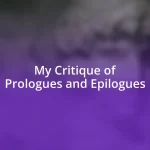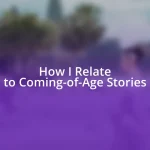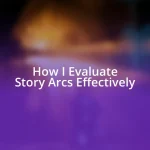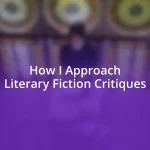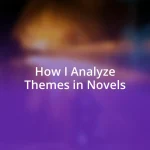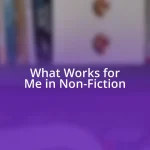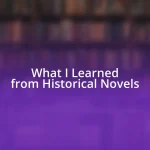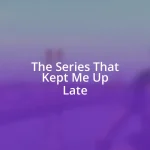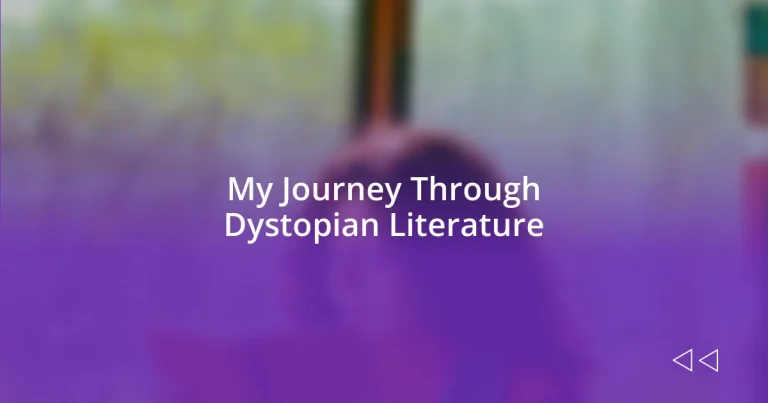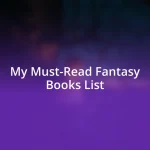Key takeaways:
- Dystopian literature reflects societal fears, encouraging introspection about freedom, control, and the fragility of rights through cautionary tales.
- Key themes include totalitarianism, lost humanity, social stratification, and resistance, instigating conversations about their relevance in our lives.
- Prominent authors like Ray Bradbury, Philip K. Dick, and Octavia Butler offer powerful narratives that provoke deep emotional and philosophical reflections on human existence.
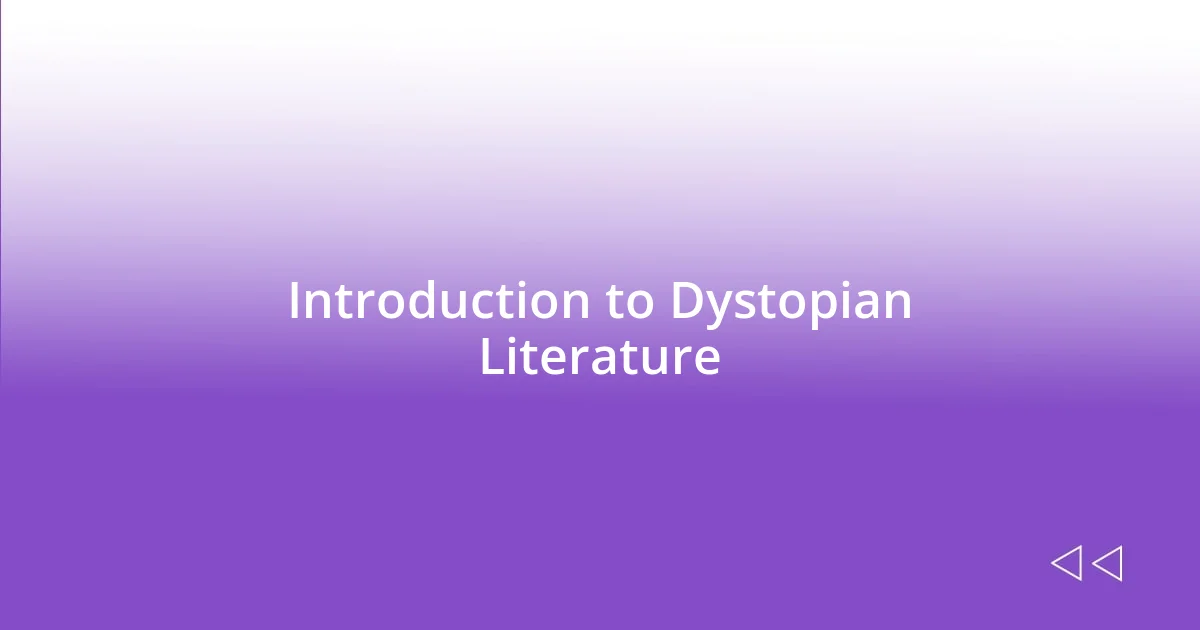
Introduction to Dystopian Literature
Dystopian literature has a unique way of reflecting society’s fears and challenges. I remember the first time I picked up George Orwell’s “1984.” It was eye-opening to see how a seemingly fictitious world mirrored real societal issues, making me question the truths I accepted in my own life.
As I dove deeper into these haunting narratives, I found myself connecting on an emotional level; stories like Aldous Huxley’s “Brave New World” left me pondering the nature of happiness and conformity. Why do we often crave stability at the expense of our freedom? These questions linger in my mind long after I’ve closed the book, inviting me to explore not just fictional worlds, but the very essence of human existence.
Dystopian narratives serve as cautionary tales, urging us to consider the potential consequences of our choices. I can’t help but feel a chill when I think about how easily we might slip into similar realities, blurring the lines between fiction and our own lives. Isn’t it fascinating how literature can act as both a mirror and a warning?
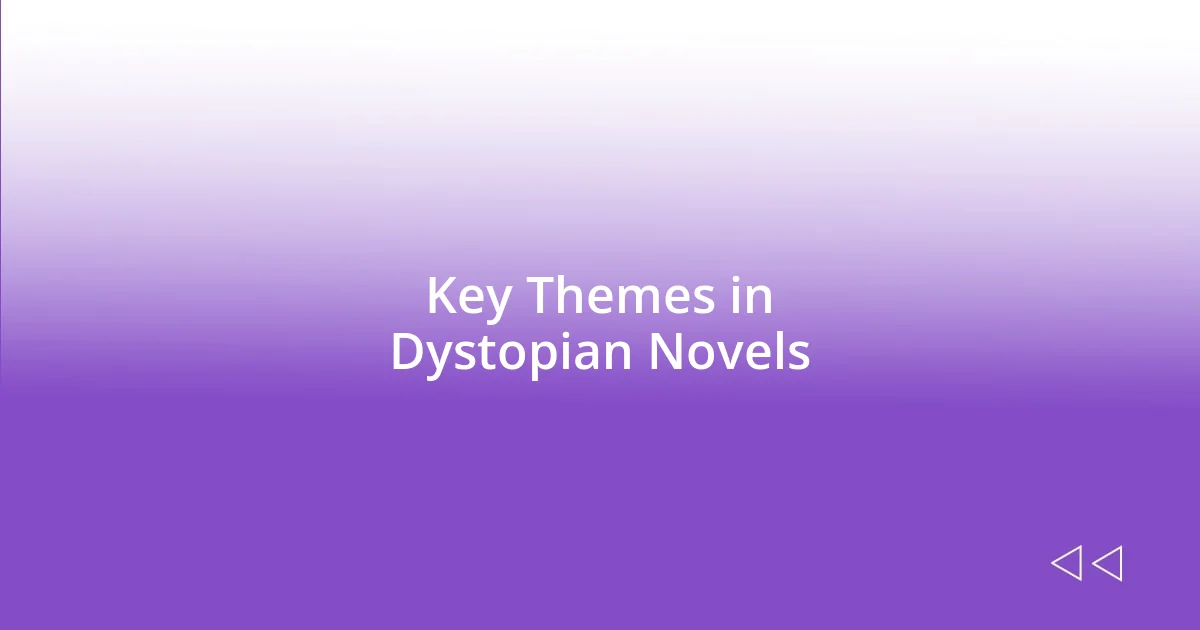
Key Themes in Dystopian Novels
One of the core themes that permeates dystopian novels is the exploration of totalitarianism. These stories often feature oppressive governments that strip away individual freedoms, compelling readers to reflect on their own realities. I still vividly recall how Margaret Atwood’s “The Handmaid’s Tale” made me question the fragility of women’s rights and autonomy, illustrating how easily such liberties can be compromised. It’s a reminder that real-world implications often shadow fiction.
Here are several key themes you might encounter in dystopian literature:
- Oppression and Control: Totalitarian regimes and their mechanisms of surveillance.
- Lost Humanity: The dehumanization of individuals in favor of societal conformity or stability.
- Social Stratification: Class divisions and the consequences of inequality.
- Technology’s Role: The dual nature of technology as both savior and enslaver.
- Environmental Despair: Consequences of neglecting our planet, leading to catastrophic scenarios.
- Resistance and Rebellion: The struggle against oppressive systems and the quest for freedom.
These themes serve not only as reflections of societal anxieties but also as catalysts for meaningful discussions about our future. Each time I finish a novel, I often find myself thinking about how these themes can manifest in various forms in our everyday lives, making dystopian literature an essential lens through which to examine our world.
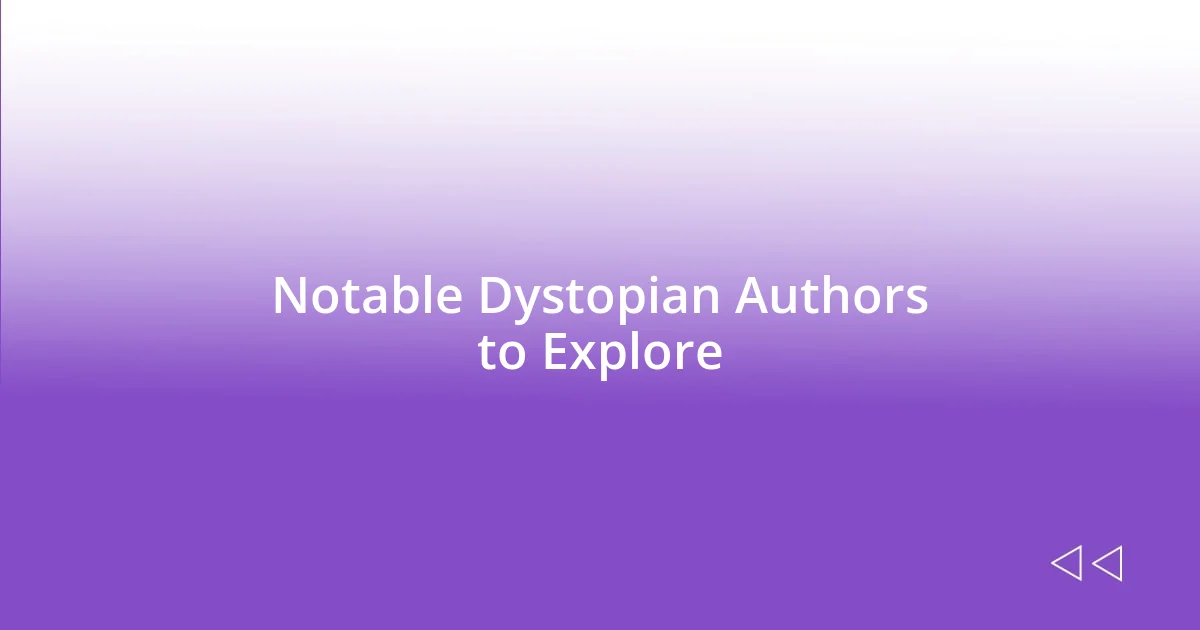
Notable Dystopian Authors to Explore
Exploring the realm of dystopian literature introduces us to a lineup of talented authors whose visions have shaped the genre. One author who stands out is Ray Bradbury, particularly for his iconic work, “Fahrenheit 451.” I remember feeling a fire ignite within me as I read about a world where books faced censorship. It made me appreciate the simple act of reading and the immense power of knowledge.
Another pivotal figure is Philip K. Dick, known for his mind-bending narratives that often blur the lines of reality. His novel “Do Androids Dream of Electric Sheep?” not only fascinated me with its futuristic concepts but also challenged my understanding of humanity and empathy. How do we define what it means to be human? This was a question that lingered in my mind long after I flipped the last page.
Lastly, we have Octavia Butler, who brought a unique lens to dystopian themes through her works, such as “Parable of the Sower.” I was genuinely moved by her portrayal of resilience in the face of societal collapse. Butler’s ability to weave personal and collective trauma into her narratives showcases the depth of human experience. It reminds me of how literature can reflect our struggles and aspirations, pushing us towards a brighter future.
| Author | Notable Work |
|---|---|
| Ray Bradbury | Fahrenheit 451 |
| Philip K. Dick | Do Androids Dream of Electric Sheep? |
| Octavia Butler | Parable of the Sower |
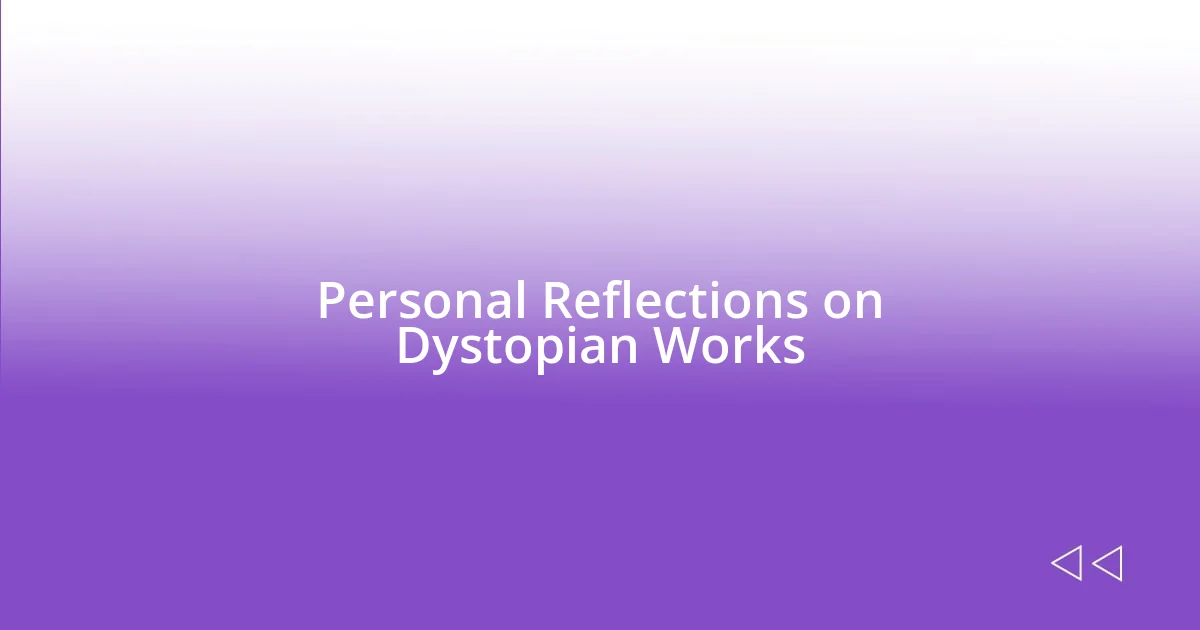
Personal Reflections on Dystopian Works
Reflecting on my relationship with dystopian literature, I often find myself immersed not just in the narratives but also in the emotions they evoke. I remember sitting alone with “1984” by George Orwell, feeling an eerie chill as the themes of surveillance crept into my consciousness. It’s unsettling to think about how easily we can slip into a world where our every move is monitored. Have you ever considered how close we might be to such realities in our own lives?
The visceral impact of dystopian stories lingers long after the last page has been turned. I recently revisited “The Dispossessed” by Ursula K. Le Guin and was struck once again by the complexities of anarchism and capitalism explored within its pages. Each character felt so real, their struggles tapping into my own frustrations with societal structures. It left me questioning: what sacrifices are we willing to make for the sake of progress? This is the type of introspection I find richly woven throughout dystopian literature.
Ultimately, these narratives become a mirror, reflecting not only the darker aspects of humanity but also our capacity for resilience and hope. I vividly recall finishing “Station Eleven” by Emily St. John Mandel and being inspired by the characters’ persistence amid chaos. It forced me to confront my views on the fragility of civilization and the beauty of human connection, even in dire circumstances. Isn’t it fascinating how a fictional world can provoke such deep contemplation about our own?
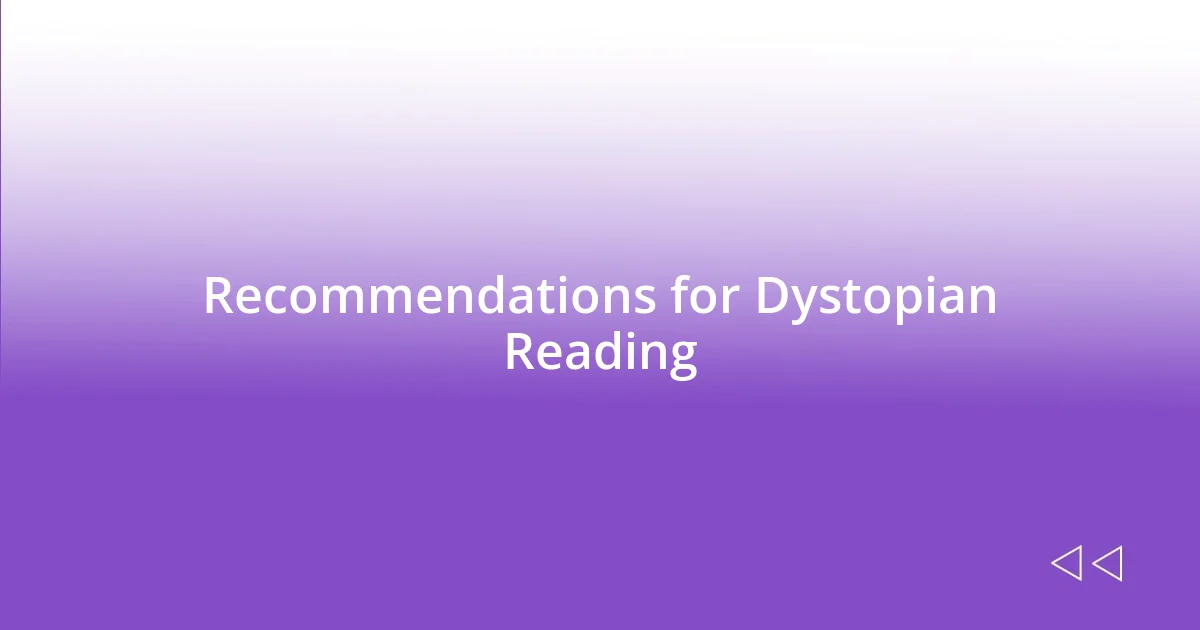
Recommendations for Dystopian Reading
Recommendations for Dystopian Reading
If you’re looking to dive deeper into the world of dystopian literature, I highly recommend starting with “The Handmaid’s Tale” by Margaret Atwood. I vividly recall how each page turned felt like peeling back layers of a harsh reality. Atwood’s exploration of themes like power and gender dynamics left a lasting impression on me. Have you ever faced a narrative that made you question your own beliefs? That’s the kind of thought-provoking experience Atwood offers.
Another gem I suggest is “Brave New World” by Aldous Huxley. The chilling depiction of a society that values pleasure over individuality truly struck a chord with me. I remember feeling a mix of intrigue and discomfort as I pondered the implications of a world devoid of deep emotions. Doesn’t it make you wonder how far society might go in pursuit of happiness? Huxley brilliantly prompts us to reflect on the consequences of our decisions.
Lastly, don’t miss out on “The Road” by Cormac McCarthy. The stark, post-apocalyptic scenery combined with the raw journey of a father and son tugged at my heartstrings. It’s a haunting reminder of the lengths we’ll go to protect those we love. As I read, I found myself questioning: amidst all the despair, what fragments of hope can we cling to? McCarthy captures that beautiful tension between despair and hope, a powerful theme that resonates long after you close the book.
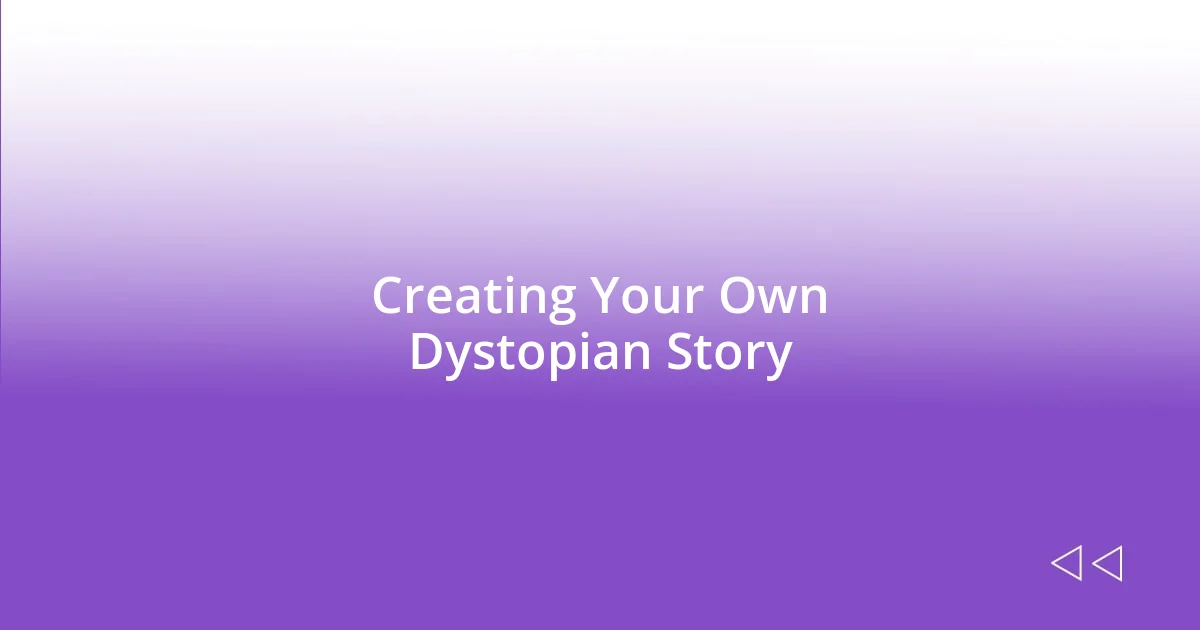
Creating Your Own Dystopian Story
Creating your own dystopian story requires a blend of vivid imagination and a keen understanding of societal issues. I like to start by contemplating the world around me. What anxieties are prevalent today that might spark a cautionary tale? For instance, when I reflect on the rapid advancements in technology, it makes me wonder: what if those advancements lead us down a path of dehumanization?
Once I pinpoint a central theme, I focus on the setting as it’s crucial for establishing the tone. I often visualize a bleak urban landscape drenched in gray, reminiscent of the environments in some classics, yet unique to my vision. I remember sketching out a city where colors fade away as people’s dreams disappear, which evoked a sense of despair and urgency in my narrative. Have you ever felt an environment influence your mood? Imagining such a world pushes me to explore animalistic survival instincts in my characters.
Character development is another vital aspect of crafting a compelling dystopian tale. I aim to create protagonists who resonate with the reader, someone who faces extraordinary challenges yet embodies relatable human flaws. I recall writing about a character who struggles with their morality in a regime that demands obedience at any cost. It’s fascinating to think: under pressure, how would you react? This exploration of inner conflict not only adds depth to my story but also sparks important conversations about ethics and freedom.
